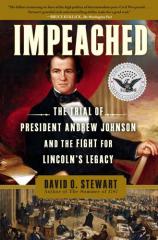Impeached: The Trial of President Andrew Johnson and the Fight for Lincoln’s Legacy
Review
Impeached: The Trial of President Andrew Johnson and the Fight for Lincoln’s Legacy
Only 35 years ago the certainty of impeachment and conviction
drove an American President to resign in mid-term. Only 11 years
ago another President was acquitted after trial by the U.S. Senate.
Last year “Impeach Obama” bumper stickers were
available even before the current President took his oath. Thus the
time is ripe for a fresh look at the attempted impeachment of
Andrew Johnson back in 1868. This was the case that set the tone on
this momentous issue and laid down ground rules that have been
followed ever since.
The conventional account --- the one we all learned in high
school --- held that Johnson was attacked on a flimsy pretext by
the Radical Republicans merely because he tried to carry out the
assassinated Lincoln’s policy of reconciliation and leniency
toward the defeated Confederate States. The anti-Johnson faction
allegedly wanted the South to be treated like a conquered enemy
country, its leaders disciplined and the freed blacks given their
rights forthwith. The Radicals were painted as partisan zealots,
Johnson as a weak and flawed man but nonetheless the victim of a
savage political vendetta.
David O. Stewart, a lawyer and respected historian, begs to
differ. His hero --- are you ready for this? --- is dour and
implacable Thaddeus Stevens, the “soul” of the
impeachment movement. He sees Johnson’s defenders as a cabal
of self-seeking officeholders and sleazy bagmen. His evidence,
though largely circumstantial, is voluminous and marshaled with
lawyerly expertise. Bribery and backroom dealmaking were rampant on
both sides, Stewart says, but he devotes much more space to the
activities of Johnson loyalists than to those of his opponents.
The conventional hero of this story over the years has usually
been Senator Edmund Ross of Kansas, a Republican whose vote was in
doubt down to the last minute, but ultimately went in
Johnson’s favor, giving him 19, the minimum needed for
acquittal in the 54-member Senate under the two-thirds rule
specified by the Constitution. Stewart is at pains, however, to
cast doubt on Ross’s motivation, implying, without being able
to prove, that he could have taken a bribe on the night before the
crucial vote, noting that his presence in the Senate resulted from
questionable dealing back in Kansas, and that after Johnson was
spared Ross asked for and got a large bundle of political favors.
Stewart quotes without comment Ross’s famous remark that as
he cast his decisive vote “I looked down into my open
grave.”
Stewart has done a commendable job of mining the historical
archives to bring the story of Johnson’s ordeal to life,
though perhaps he goes a tad too far by claiming that the verdict
may have averted a second Civil War.
Johnson’s obvious flaws get full treatment from Stewart.
The President was indeed a racist who opposed enactment of the 14th
Amendment guaranteeing black suffrage; he was also a pugnacious and
uncompromising politician whose truculence caused him to miss many
opportunities to escape the wrath of his enemies in Congress. He
actually seemed to delight in provoking them.
The supporting cast in the story is wonderfully colorful as
drawn by Stewart: Bluff and blustery Ben Butler of Massachusetts,
point man of the impeachment team; Ben Wade of Ohio, whose possible
takeover of the White House if Johnson were dismissed caused many
to oppose impeachment; Edwin Stanton, the crafty Secretary of War;
President-in-waiting U.S. Grant; ambitious Chief Justice Salmon P.
Chase; and the scheming New York journalist Thurlow Weed. Beyond
these major players there lurks a shadowy cast of raffish
wheeler-dealers whose efforts to corrupt the trial process may have
influenced the outcome, but whose names --- Sam Ward, Perry Fuller,
Edmund Cooper --- never appear in the history books. Perhaps most
fascinating of all is the attractive teenage sculptress Lavinia
(Vinnie) Ream, who may have used her charms to switch a few
votes.
Stewart is also thorough in parsing the vague Constitutional
phrase “high crimes and misdemeanors” as grounds for an
impeachment. What exactly does it mean? Can a President be deposed
simply for incompetence or unlikability, which are not crimes,
after all?
Whether you agree with Stewart’s somewhat skewed theory of
villains and heroes in this great drama, his final conclusion is
certainly sound: Impeachment is a necessary but dangerous tool, to
be used only in the direst of perilous cases. The mere threat of it
is usually enough to get justice done. Ask Richard Nixon.
Reviewed by Robert Finn (Robertfinn@aol.com) on January 22, 2011
Impeached: The Trial of President Andrew Johnson and the Fight for Lincoln’s Legacy
- Publication Date: June 15, 2010
- Genres: History, Nonfiction
- Paperback: 464 pages
- Publisher: Simon & Schuster
- ISBN-10: 1416547509
- ISBN-13: 9781416547501





